By Melissa Spear
Executive Director
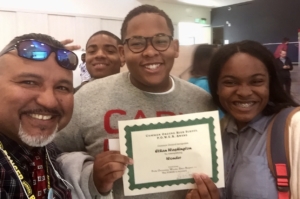
Freshman Ethan Washington was one of Common Ground High School’s recent POWER award recipients following orientation. Ethan received the award for Wonder. Photo by Mel Morales/Visually Impaired Photography
There was plenty of positive energy at Common Ground this month. We welcomed our incoming high school freshmen and transfer students. Our campus came to life as our returning students joined us once again, and all our students settled into their new community. This week, we’ve enjoyed watching this year’s cohort of Nature Year students discover and rediscover our place. Community programs staff is preparing to welcome the hundreds of children who will be joining us as our other children’s programs ramp up in early October. I am so grateful for all of the positive energy that these young people bring to Common Ground.
At the same time I am acutely aware of the events that continue to provide a difficult and disturbing context within which all our work takes place, and pose significant challenges that our young people will be forced to face as they begin to take responsibility for their futures. It has been several weeks since Charlottesville and media attention has now shifted to our most recent crises in Houston and Florida. Our propensity is to look at all of these events as isolated incidents – whether a display of hate and violence by a group of white supremacists, or historic storms wreaking havoc on major population centers, we seem to be perfectly satisfied with treating each of these events as simple, stand-alone newsworthy happenings, which is perhaps what I find even more distressing than the occurrences themselves.
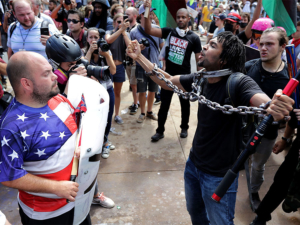
CHARLOTTESVILLE, VA – AUGUST 12: White nationalists, neo-Nazis and members of the “alt-right” exchange insluts with counter-protesters as they attempt to guard the entrance to Lee Park during the “Unite the Right” rally August 12, 2017 in Charlottesville, Virginia. (Photo by Chip Somodevilla/Getty Images) via 7NewsDenver
There is plenty of evidence demonstrating that each of these events is in reality born of a larger, much more challenging issue that if not addressed will have devastating consequences reaching far beyond the incidents in and of themselves. I have not seen the broad-based, urgent acknowledgement and commitment to dealing with the issues that underlie the events in Charlottesville, or contending with the conditions that have contributed to the intensity of the storms that hit Houston and Florida. This is what keeps me awake at night worrying about the legacy we are leaving our young people. If we don’t consider the larger systems at work when we leap in to solve problems, the solutions we devise will fail to address the underlying cause of the crisis. As a result we will be destined confront the same challenges over and over again.
There have been many powerful statements made in reaction to the events in Charlottesville that disavow the overt display of hate, racism, antisemitism, intimidation and violence of white supremacists that occurred there. However, most statements focus on condemning the organizers of the rally and their actions as if this were a singular event by an isolated group of people that had no relationship to our broader culture. A few courageous organizations went beyond simple condemnation to recognize that white supremacists are the product of historical structures, policies, norms and institutions designed to perpetuate white privilege and white supremacy. This statement made by the Christie Huck, the Executive Director of the City Garden Montessori School makes clear that we are dealing with a broader and deeper challenge, and owns up to the ways our own educational institutions contribute to the injustice and inequity that underlies the event.
It reads, in part:
we have learned that white supremacy has been embedded in the structures, policies, and institutions that have made up our country since its inception—that it is like “smog” that we breathe in, without even knowing it. Though the events in Charlottesville are a very visible example of racism, white supremacy exists in many ways in our society—including in our schools.
This statement resonated with all of us at Common Ground, and it is one we would have been proud to make. Like City Garden, we are faced with the challenge of an achievement gap between our white students and our students of color. We also face a disparity in how discipline (or in our case restorative practice) is applied across race and gender. The balance of power within our organization still lies primarily with white management, and we are not satisfied that our programs feel as accessible to and welcoming as they should to communities of color. Like City Garden, Common Ground is hard at work to address these challenges.
If we are to live up to our American ideal – that we are all created as equals – and end the destructive violence of white supremacy we must move beyond simply condemning their actions and explicitly recognized the relationship between their resurgence and historical structures, policies, norms and institutions that perpetuate white privilege.
As a white person I understand how painful it is to first recognize and then come to terms with how our whiteness has benefited us at the expense of others. But as white supremacists have once again begun to feel comfortable going public with their destructive, bigoted, and violent world view, it is essential that we come to terms with the fact white supremacy is deeply embedded into our systems, and has been since our nation’s inception, just as we must accept the overwhelming evidence of the inequity, disparities and trauma experienced by groups who do not fit the ideal of white supremacy: White, cisgender, heterosexual and male.
While the display of hate, violence and intimidation at Charlottesville clearly exposed the ugly underbelly of white supremacy, the manifestations of white supremacy are for the most part buried under layers of social construct that make them difficult to discern. Like the air we breathe, those aspects of our culture that perpetuate white privilege are difficult to see but never the less there, serving their purpose, and impacting lives. While we all would like to distance ourselves from the events in Charlottesville we cannot turn our backs on this truth – what happened in Charlottesville was very simply an open, forthright, violent expression of white supremacy that continues to be manifest in innumerable, less obvious but just as impactful ways throughout our society.
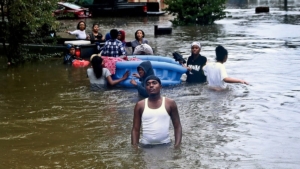
People walk down a flooded street as they evacuate their homes after the area was inundated with flooding from Hurricane Harvey on August 28th, 2017 in Houston, Texas. Joe Raedle/Getty via Rolling Stone
Like Charlottesville, the devastation wreaked by Harvey and Irma is horrific, and similarly, it is directly related to a much broader significant challenge – in this case that of climate change – which in all of the coverage of the storms has barely been acknowledged by the media. There is irrefutable evidence that climate change is contributing to sea level rise and is leading to an increase in the frequency and intensity of storm events such as the ones causing the devastation in coastal Texas and Florida. Yet our focus remains solely on the destructive power of the storms. We continue to ignore the larger implications of climate change and in doing so we fail to devise an appropriate response to its long term impacts. Even more disturbing, despite scientific consensus climate change deniers are successfully defunding and dismantling all of the programs intended to address the challenges posed by rising temperatures.
Unless we recognize and fully embrace the challenge presented by climate change, the storms in Houston and Florida become just one more “historic event” that will be followed by another and another and another in more and more rapid succession, harming people, destroying property and draining resources away from important strategic programs designed to provide long term benefit and expending them instead to address short term needs related to serial crises.
We will continue to disinvest in programs designed to build resiliency opting instead to invest in rebuilding in high risk coastal and flood zone areas that will inevitably once again be subject to the destructive force of future “historic” storm events. We will be wasting precious resources that we urgently need to deploy toward addressing the larger, systemic issue of climate change.
I will admit that I have come close to despair as the events in Charleston, Houston, and Florida have unfolded, in particular in light of the inadequate response that neglects to acknowledge the underlying systemic challenges. But I also recognize that despair is not a helpful response. It accomplishes exactly nothing.
And so I look for ways to respond that will make a difference. One response is to write this blog and be clear about where I stand, and where Common Ground stands on these issues.
The other is to be grateful for our young people, and continue to work to nurture and support them, to build their capacity for leadership, their connections to the natural world, their ability to think clearly and critically, to analyze and evaluate data, and to be unafraid to stand for what they believe is true and just.
I will do what I can while I am able—we all need to do what we can— to help turn the ship so that we can avoid the iceberg, and to hand over a ship that is sea worthy, because soon our young people will be assuming the role of Captain. Welcoming our young people back to Common Ground this has given me hope. I am confident that regardless of the state of affairs when these youth assume leadership roles they will ready to take on the challenge.

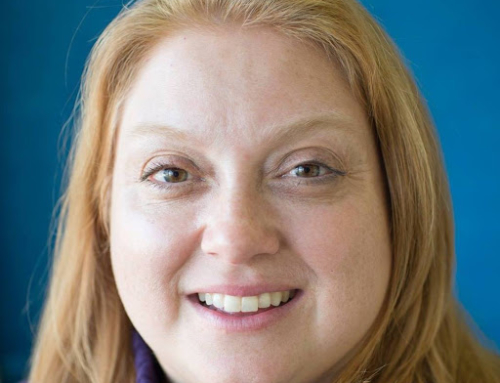
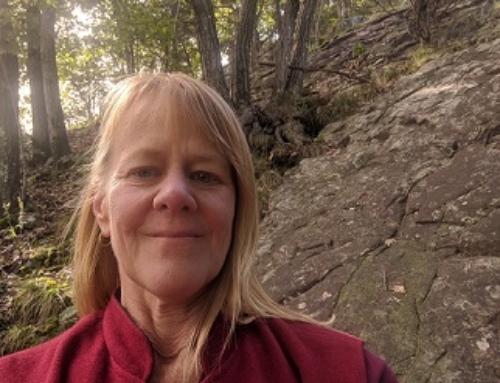
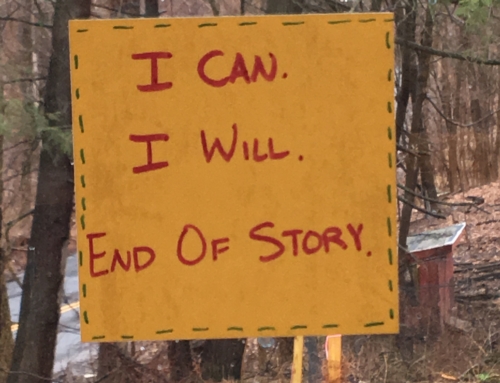
Leave A Comment